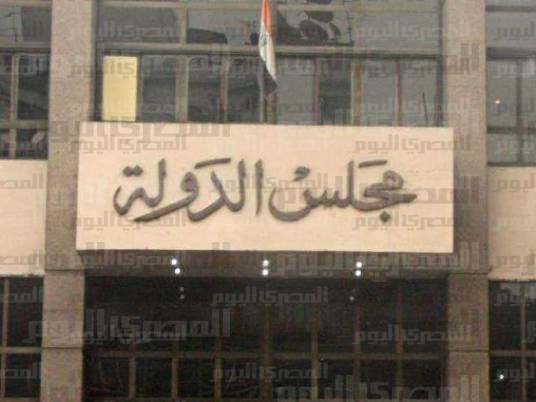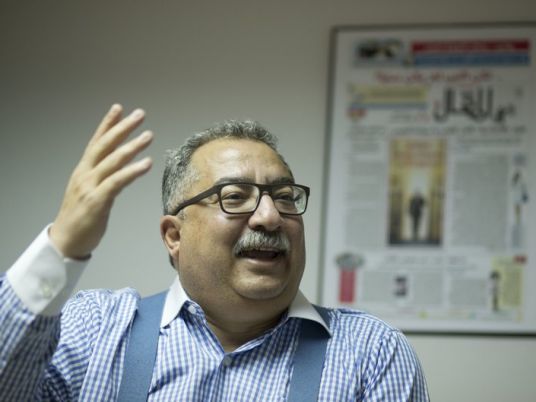Prosecutor General Abdel Meguid Mahmoud won his battle against Muslim Brotherhood President Mohamed Morsy by exploiting the latter’s violation of the law when Morsy announced an executive decision to remove Mahmoud from office and appoint him ambassador to the Holy See.
Just like in the killing of Egyptian security guards in Rafah, when Morsy had an opportunity to oust the Supreme Council of the Armed Forces (SCAF), he thought the acquittals of the Battle of the Camel defendants provided a golden opportunity to overthrow the Prosecutor General.
Morsy’s decision to oust Mahmoud seemed to be a revival of the conflict between the judiciary and executive powers. Mahmoud said he would stay in his position since the law states that a public prosecutor may not be removed — unless he or she dies, retires or resigns.
Morsy then backpedaled on his decision with Vice President Mahmoud Mekky saying the whole affair was a misunderstanding, while presidential spokesperson Yasser Ali blamed the media.
Believing that attack is the best form of defense, Mahmoud proceeded to exploit the Brotherhood’s mistake He said he met Hossam Gheriany, head of the Constituent Assembly,with close links to the Brotherhood, and Minister of Justice Ahmed Mekky on Thursday, and claimed both tried to persuade him to resign. He added Gheriany warned him of upcoming dangerous protests.
“The protesters might come to your office and assault you like the late former head of the State Council Abdel Razeq al-Sanhoury,” he says Gheriany told him. Sanhoury, head of the state council at the beginning of former President Gamal Abdel Nasser’s rule and a prominent legal expert, was assaulted in his office in 1954 after he adopted positions independent of the executive authority and cancelled some of the president’s decisions. The military regime in power then managed to control what came to be known as the Judges’ Massacre by ousting some judges and assigning many of them administrative jobs.
Even though Mahmoud is not as important a figure as Sanhoury, times have changed. In his battle, Mahmoud was able to call a press conference at his office and steer public opinion against Morsy’s decision, an unthinkable option in Sanhoury’s time.
Essam al-Erian, the acting president of the Freedom and Justice Party, threatened Mahmoud on Twitter, saying that his best option was to accept the president’s assignment with dignity. The Brotherhood also hoped their call for a protest last Friday was going to mobilize a number large enough to buttress the ousting and pressure Mahmoud to go without a fight. However, their conspiracy was not well-timed. Political powers had already been mobilizing protesters for another protest to mark the 00 days since Morsy assumed power and call for reforming the Constituent Assembly.
Feeling unrealistically potent, Brotherhood members clashed violently with the other protesters, creating the opportunity for Mahmoud to exploit their mishap.
in a tone as defiant as Erian’s, Mahmoud told reporters, “I am addressing the members of the Muslim Brotherhood. Your words won’t scare me. I am staying in my office and will protect myself and my position, as well as the public prosecutors office and the independence of the judiciary.” He went on to say, “my position will only become vacant if I am assassinated, and assassination is something some political factions are used to.”
Paradoxically, members and close observers of the Egyptian justice system are fully aware that defending the independence of the judiciary was never on Mahmoud’s agenda. He was one of Mubarak’s men, who failed to draw a line between the executive branch and his position as public prosecutor. In fact, it often appeared as though the public prosecutor’s office was affiliated with the presidency. Mahmoud is also the last senior official of the old regime to survive Mubarak’s ouster.
Paradoxically, Mahmoud is also responsible for bringing Mubarak’s regime icons to justice today. Almost two years after the revolution, the acquittals of former regime figures and disappointing verdicts have demonstrated that Mahmoud, like the SCAF, was protecting his old friends.
The Public Prosecutor’s office did not present sufficient evidence to indict the defendants, which provided an opportunity for judges to justify their disappointing rulings. Mahmoud, meanwhile, passed the buck onto the executive authorities, which he said did not cooperate in providing evidence.
So it is ironic that today, Mahmoud, described by many, including Fekry Kharroub, head of the Alexandria Criminal Court, as “the most politicized public prosecutor ever” and a former Mubarak man, is at the center of a public controversy over the legitimacy of the new president’s decision on the grounds that it is an assault on the “independence of the judiciary” — a precarious independence that Mahmoud himself is accused of particularly assailing under Mubarak’s rule.
Magdy Samaan is a journalist working at the Daily Telegraph’s Cairo Bureau. He previously worked for Al-Shorouk and Al-Masry Al-Youm.
This article was originally published in Egypt Independent's weekly print edition.



